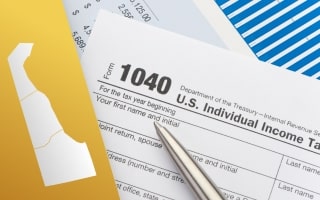Property Tax Records in Delaware

Except for a small number of states, anyone who buys a home or condo in the U.S. will need to pay property taxes annually. The same is true in Delaware. While Delaware collects property taxes once per year, you'll likely pay them as part of your monthly mortgage payment. Delaware consistently ranks as having some of the lowest property taxes in the country. No matter where you live in the state, your property taxes will be well below 1%.
When you purchase a home in Delaware, your tax rate depends on which county you live in. However, the average rate for the entire state is 0.55%. When you receive your tax bill, you'll need to pay it to your county tax assessor's office. For example, homeowners who live in Sussex County will need to pay their taxes to the Sussex County Assessment office.
Property tax assessments in Delaware have been made since the late 17th century. Several additional taxes were introduced in the state towards the end of the 19th century. Even though the counties are responsible for levying the taxes, the state determines how the assessments are performed.
Property Tax Assessment in Delaware

Delaware property taxes are based on factors like your location and the appraised value of your home. However, property taxes aren't calculated with the appraised value. Instead, your taxes depend on your home's assessed value. The only way to identify assessed value is first to determine the property's market value, which naturally changes from year to year.
If local buyer demand increases from one year to the next, the value of your property might rise considerably. When this happens, your home's assessed value will go up, which will lead to you paying more in property taxes.
In August 2023, Governor Carney signed House Bill 62 into law. This law requires a reassessment of real property to occur at least once every five years. Counties can choose to perform mass assessments more often, which means that property taxes might increase every year.
Before this law was passed, local governments didn't need to reassess property values regularly, which meant that taxes were based entirely on the values that were calculated when properties were last assessed. In Kent County, properties were reassessed in March 2024 for the first time since 1987. Assessed values are equivalent to 60% of the market value for homes in Kent County.
Imagine that you own a home with a market value of $350,000. If you live in Kent County, the assessed value of this property will be $210,000. Your property taxes are based on this amount. Let's say that you live in Dover. The annual property taxes you pay are calculated by first dividing the assessed value by 100. Every $100 of the assessed value is taxed at $0.30. The property tax rates for the three counties in Delaware are:
- Kent County: 0.56%
- New Castle County: 0.85%
- Sussex County: 0.42%
Calculate Delaware Taxes
A Delaware property tax calculator is a valuable tool for understanding how property taxes are determined in the state. This tool simplifies the process for both homeowners and real estate investors by allowing users to input key property details and estimate their tax assessment and annual liability based on local jurisdiction rates.
In Delaware, property taxes are set and collected at the county and municipal levels, with no statewide property tax. The property tax calculator can offer a clearer picture of your annual tax responsibilities and help identify available exemptions and tax relief programs, such as the Senior School Property Tax Credit, which offers up to $500 in savings for eligible homeowners 65 and older, and local exemptions for low-income seniors, disabled individuals, and veterans depending on the county.
using our property tax calculator.
Delaware Property Tax Records: What Are They?

All property taxes in Delaware are levied by the county governments to cover a wide range of costs. Tax rates are the same regardless of the type of property you buy. The many expenses that your property taxes help pay for include the following:
-
School systems
-
City services
-
Libraries
-
Vocational-technical schools
Before you purchase a home in Delaware, consider checking the property tax records to learn more about what you're buying. These records are maintained by each county in Delaware and include a considerable amount of details and information that you can use to determine if the home is worth the sale price. For example, you can look at recent property taxes or view maps of the location.
While each county has a slightly different online system that provides access to these records, your experience shouldn't differ too much from county to county. In Sussex County, you're able to search for tax records by parcel ID, address, or owner.
You can also use the site's "Advanced Search" if you're unable to find the property with the other parameters. Once you locate the tax records for the property you're interested in, you'll be able to review a lot of information. Some of the details listed in this document include the following:
-
Property location
-
Tax district
-
School district
-
Land value and improvement value
-
Legal description
-
Previous sales and owners
-
Year built
-
Total fixtures
-
Roof type
-
Permit details
-
Sketch
-
Map
Property Tax Exemptions and Deductions in Delaware

If you own a home in Delaware, you may be able to apply for one of many tax exemptions and deductions that homeowners have access to. While counties can create their own tax breaks, most locations offer a handful of exemptions to accommodate numerous scenarios. For example, New Castle County provides several tax exemptions, a couple of which are detailed below.
Disabled Veterans School Property Tax Credit: Based on a law that Governor Carney signed in 2021, disabled veterans have access to a credit that covers all property taxes. If you qualify, this credit can be applied to your non-vocational school district property tax on your primary residence. To obtain this credit for the following tax year, you'll need to apply by April 30. The other qualifications are:
- You must own a home in Delaware for at least three years
- Your disability compensation needs to come from a permanent and total disability, which means that you're unable to be employed in the U.S.
Over-65 and Disability Exemption: This specific exemption is available to senior citizens over 65 and individuals with disabilities. You must be at least 65 years old before July 1 of the current fiscal year to obtain this exemption. You must also own the property and live there.
Whether you're disabled or a senior citizen, your annual income can't exceed $50,000, and the property's assessed value can't be higher than $125,000. To qualify, all previous property taxes must be paid in full. You may still be able to qualify for the exemption if you're actively enrolled in a payment plan. This specific exemption reduces your home's assessed value by $32,000.
How To Search Property Tax Records in Delaware

Searching for property tax records in Delaware is easy. These records are available online and can be researched as long as you have some info about the property you're interested in. Keep in mind that every county has an assessment office that can help you obtain Delaware property tax records.
The government offers a comprehensive database that should have up-to-date records for every property in the city. Some of the information is downloadable. If you want to research tax records in Sussex County, their database is easy to use.
Along with the four parameters mentioned earlier, you can also bring up a map of the county and identify the specific property that you're looking for. The other two counties in Delaware offer similar websites. If you enter an address and get a result that says "No properties found", take out any directions or numbers in the address. If you solely input the street name, the engine will show you a list of every property that's located on the street, which should simplify your search.
Likely the most effective option is to use an online third-party database that gives you access to the same information as well as some additional data that can help you when you're looking to buy or invest in a home. Consider using PropertyChecker to search for tax records. This service is available in all 50 states and gives you the tools you need to find property tax records in Delaware.
If you use PropertyChecker, you can narrow and refine your search by typing in a specific address, owner name, parcel ID, or phone number. Once you enter this information, you'll receive numerous documents alongside the property tax records, which extend to:
-
Deeds
-
Loan records
-
Neighborhood information
-
Building permits
-
Lien records
-
Foreclosures
-
Purchase history
How To Appeal Property Taxes in Delaware

Property tax assessments aren't always accurate. If the value of your home increases substantially, even without any renovations or improvements, you may be able to file an appeal in Delaware. Follow the steps below to fill out and submit a timely appeal.
Step 1: Wait for your property tax bill to arrive in the mail. These bills are often mailed out on August 1 each year. You'll have until September 30 to make your payment to the tax office. After this date, a 1.5% fee is applied every month until the taxes are paid.
Step 2: If you receive your tax bill and believe that the assessed value is higher than it should be, you can file an appeal with the county assessment office. The appeal board in Sussex County meets during the initial 15 working days in March every year to listen to appeals. New Castle County meets in January, April, July, and October.
Step 3: On the hearing date, make sure that you have the necessary documentation to show that the property valuation is too high. The board will look at this evidence to determine if the assessment is accurate. If they find that it's higher than it should be, they can reduce the value, which will lower your property taxes.
Step 4: You won't know the board's decision immediately. They'll send you a written notice by mail. If you disagree with this decision, you can appeal to the Superior Court, which you must do within 30 days after receiving the written notice. Keep in mind that additional evidence can't be presented to the Superior Court. They'll look at the record of the previous hearing to make their determination. Luckily, appealing property taxes in Delaware is usually a straightforward process, especially for those who come prepared.
How Property Tax Records Impact Real Estate Transactions in Delaware

Whether you're selling or buying a home in Delaware, property taxes can play a major role in the transaction. For the buyer, higher property taxes lead to larger mortgage payments. Since Delaware property taxes are usually affordable, the risk of someone deciding to opt out of buying a home because of these taxes is low.
However, property taxes vary from county to county. A buyer might switch from purchasing a home in New Castle County to buying one in Sussex County because the property taxes in Sussex County are considerably lower. If you're selling a home in Delaware, you shouldn't have any problems getting offers because of property taxes. However, property taxes can become a factor if you price your home too high.
If you're investing in a Delaware property, higher taxes can diminish your cash flow, which can make the investment less valuable. When you're researching potential real estate investments, consider the tax rate as well as the presence of any liens on the property.
If a homeowner doesn't pay their taxes on time, the county government will attach a lien to their property. The lien is meant to be paid out when the property is sold. If, however, the lender forecloses on the home before it can be sold, it will be auctioned off via a delinquent tax sale.
In Sussex County, this process is known as a Sheriff Sale. It occurs at 9:30 a.m. on the third Tuesday of every month. Investors will have the opportunity to bid on any delinquent properties. If you win the bid, you must pay 20% of the total amount on the date of the sale. Keep in mind that 100% of the overdue property taxes must be paid on the same day. Sherrif sales in Sussex County, Delaware, can be lucrative for buyers who know what they are doing.
Free Delaware Property Tax Lookup
Tax Records Please wait...
Property Tax Guide
- Property Tax Records in Delaware
- Property Tax Assessment in Delaware
- Delaware Property Tax Records: What Are They?
- Property Tax Exemptions and Deductions in Delaware
- How To Search Property Tax Records in Delaware
- How To Appeal Property Taxes in Delaware
- How Property Tax Records Impact Real Estate Transactions in Delaware
Instant Access to Delaware Property Records
- Owner(s)
- Deed Records
- Loans & Liens
- Values
- Taxes
- Building Permits
- Purchase History
- Property Details
- And More!
Free Delaware Property Tax Lookup
Tax Records Please wait...
Property Tax Guide
- Property Tax Records in Delaware
- Property Tax Assessment in Delaware
- Delaware Property Tax Records: What Are They?
- Property Tax Exemptions and Deductions in Delaware
- How To Search Property Tax Records in Delaware
- How To Appeal Property Taxes in Delaware
- How Property Tax Records Impact Real Estate Transactions in Delaware